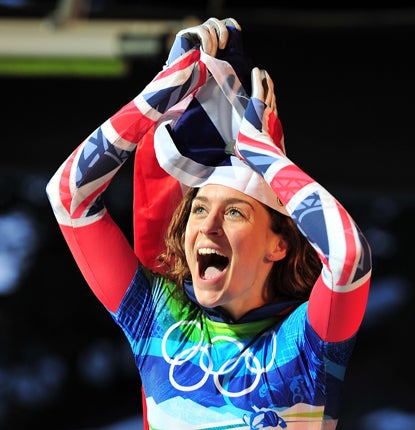Redgrave out to play Williams gold card
Skeleton star makes case for investing in future, urges Britain's greatest Olympian

Britain's greatest Olympian, Sir Steve Redgrave, had a message of defiance on a morning when the team's yield of one gold medal from these 21st Winter Games severely threatened chances of improved financial support for the next challenge in Russia in 2014.
Speaking against the backcloth of the coastal mountains, Redgrave argued that extremely high ground had been reached here by one superbly competitive – and well supported – athlete. It meant that if the British team had failed to meet UK Sport's imperative of three medals, it had nevertheless produced the supreme argument for more rather than less assistance.
Amy Williams, who won the skeleton gold with a quite stunning assurance, had shown that with the right support a British winter sports athlete could indeed beat the world, even those parts of it steeped in the Alpine tradition.
"One gold medal," Redgrave said, "is in my opinion worth five of any other kind and in Amy Williams we have a great champion. She is someone we can all be proud of – and all point to and say, 'This is what we can do if we give our best competitors a fighting chance'."
Redgrave, the winner of five rowing gold medals, was deeply impressed by the composure Williams maintained after her first spectacular run down the world's fastest, most challenging track.
Then he asked the question that must always be posed against a potentially great champion. Could she hold her nerve over the next three runs, could she seize the moments which might never come again quite so perfectly?
"Yes, she could," said Redgrave. "The thing that impressed me most about Amy was that she never lost her coolness. She always seemed to understand what she had to do. This is what happens when you have the right athlete with the right support. She had 24 hours to think about the challenge, live with the fact that she was close to gold.
"When I went to the Olympics I always thought, 'We've been telling everyone we're going to win gold for four years, now we have to go and do it'. That's pressure that can take over you if you let it."
The 27-year-old Williams, like most British athletes of winter, spring, summer and autumn before the bonanza which came with the landing of the London Games and the need for a big show in Beijing in 2008 to prime interest through the next four years, has not always enjoyed such support, living with her parents in Bath and eking out a slender income. But then UK Sport provided her with a state-of-the-art sled and she was given the chance to get the job done.
Now she is the best weapon for Redgrave as he argues that the Williams experience must be the pattern for the future. He has spent much time recently lobbying for private sponsorship of Britain's first ice centre, an equivalent of the velodrome which to came Manchester by way of a failed Olympic hosting bid.
"The results produced by the velodrome were clear in Beijing, with cycling success which has guaranteed a flow of youngsters in the sport. This is the most important thing.
"Now winter sport in Britain has got a model of its own in Amy Williams, but you cannot expect speed skaters to be competitive on a ration of just two hours a day of practice."
Redgrave's proposed centre would provide world-class facilities for the speed skaters and curlers who failed to drive home the possibilities of the Williams breakthrough.
With more than £1m worth of support, David Murdoch's world champion curling team showed clear signs of submitting to the expectation that came with being rated one of Britain's strongest candidates for success, and as the British Olympic Association chief, Andy Hunt, gathered the wagons around Amy's piece of gold, the uncomfortable fact was that too many of the 52-strong team came here with little more than a prayer.
One stark case of underachievement came with the failure of half-pipe snowboard competitor Lesley McKenna to do better than finish dead last in her third Olympics. The 35-year-old was competing in her third Olympics.
Another killing statistic is that only nine members of the team achieved personal bests at the climactic moments of a four-year competitive cycle.
This will surely strike UK Sport, charged with the task of getting value for money, as too many cases of no-hope contenders going into a competitive situation placed somewhat over their heads.
Redgrave's argument is that first must come the investment in handpicked competitors. Hundreds of thousands of pounds was put into the development of Williams' winning sled. She was even given enough financial support to move into her own flat, albeit with the need to "count her pennies" before paying the monthly rent.
The result was Britain's only medal. It may have been less than expected from an investment of £6.5m but Redgrave insists it can be more than literally weighed in gold. It showed what can be done with the right money – and, most important of all, the right people.
Join our commenting forum
Join thought-provoking conversations, follow other Independent readers and see their replies
Comments
Bookmark popover
Removed from bookmarks